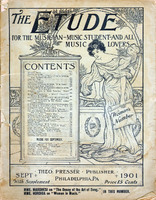To do justice to the subject given, one ought to have held a number of positions in order to be able to speak with the authority that is born of experience. Unfortunately I can only deal with the matter from a single directorship of twenty-two years in one church.
The professions are so badly mixed as to workers that we do not hear so much these days in public about the corresponding abilities of men and women. Yet it is fairly safe to say that very few men organists acknowledge that it is either fitting or possible for a woman to handle an organ properly, and without doubt the same objection is raised as to women directors. The fact remains, however, that the leader who leads is more often than not placed in the position of director, and the question of sex is not considered by music committees. It is often urged that a woman cannot control a choir. No choir that has to be controlled is worthy of the name. If it comes to the mere question of the exertion of force in a choir, that choir were better abandoned, for nothing of any real spiritual value can possibly emanate from such an organization. When the choir-leader is a trained musician, with a clear aim so far as performance goes, and with a distinctly-reverential attitude toward the service, as an act of worship, there need be no friction between director and choir.
In all the years of my service in the Calvary Church in New York we have had one soprano for fourteen years, one for five, one for a year and a half, and one for a single season. One contralto sang fourteen years, and one for a single season. One tenor sang six years, another for the same period, another for a single season. The baritone has remained the same for twenty-one years. With the exception of the two young girls whose tenure of office lasted a single season, there has been the most hearty co-operation and singleness of purpose in our work. The one object in every service has been to provide the best music that could be selected in order to illumine the lesson taught from the pulpit or to create a distinct emotional frame of mind in the congregation.
When all clergymen come to the point of realizing that the chief office of music in a church-service is to produce certain moods in the hearers upon which their oratory can play, there will follow such a revolution in church-feeling as will surprise those who now look upon the choir as a necessary evil. In choirs where the leader is of a timid type and the singers are young or aggressive, the inartistic and irreligious effect of personal display is frequently found; there is jealousy and bitter feeling. In Calvary Church the personal element has been eliminated to such a degree that, at one time when the quartet was invited to illustrate a lecture upon some rather abstruse points in musical interpretation, the comment made by many in the audience was that the most delightful feature of the singing was the entire absence of the personal element and the devotion of the singers to the artistic problem they had undertaken to demonstrate.
It is sometimes said that men do not wish to take instruction from a woman. It has been my experience that the men have shown a spirit of chivalry and a desire to produce a perfect ensemble that was just the reverse of this. With a woman it is just the same as with a man, and to succeed as a choir-director one must, first of all, have a clear-sighted vision of the result to be aimed at; an all-embracing sympathy with the singers who are to be trained; a quickness of ear to detect which voice is best fitted to produce the desired effect in the compositions sung; an intuitive perception of what the minister is feeling after; an appreciation of those vague, untellable desires that seem to underlie the ministerial requests as to music; and, above all, to be really a success as the leader of music in a church worthy of the name, one must be religious oneself, and believe thoroughly in the sanctity of music and in the necessity of keeping that music unspotted from the world, the flesh, and the devil.—Kate S. Chittenden.



